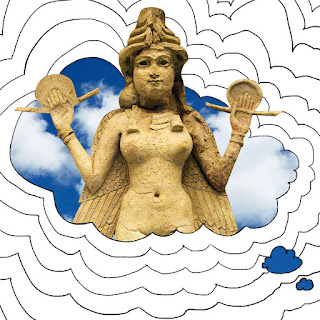Thank you, The Guardian, for publishing a wonderful article by Margaret Atwood on. the 7th of this month. Thank you, Margaret, from my heart, for reminding me that we can all write poems; easiest thing in the world, made hard only by our own internal critics.
Atwood talks about the title poem from her latest collection – Dearly. You can read it in her Guardian Article here.
So what does Atwood say about this poem? She can remember the occasion. She and her late partner, Graame Gibson, were in Stratford, Ontario, where a Skakespeare festival was taking place (she had just written Hagseed, which I talk about in this post ) It was 2017. Her knees hurt because she'd spent 'five hours in a twisted position in the back seat of a car with a one-and-a-half-year-old'. She was out, a cup of take-away coffee in her hand. 'Slow walking leads to rumination, which leads to poetry. Park benches are my friends…scribbling ensued.'
So there we have it. The template to become a poet. Walk slow. Ruminate. Find a bench. Scribble.
So simple, so easy. And this leads to something that, at the OCA, we tell our students every other day...use those notebooks; keep them handy. Atwood can't quite remember, but knows she wrote on 'some piece of paper that may have been anything from an old envelope to a shopping list to a notebook page…I'm guessing a notebook.'
She describes Dearly as 'part of its own zeitgeist', and quotes Ursula La Guin 'Only in dark the light. Only in dying life'. No wonder she then moves on to the 'Great and Terrible Mesopotamian Goddess Inanna' describing the hymns to her as 'fascinating…but they don’t cause the marrow to melt in my bones as they might have done for an ancient listener: I don’t think Inanna may appear at any moment and level a few mountains, though I could always be wrong about that.'
Cuniform from Sumatra
I have loved and worked with this goddess during the last 10 years, and, okay I don't expect her to level mountains right now either, but the story of her descent into the otherworld and her return from it is one of the the earliest surviving creative pieces of writing In cuneiform script – that is, marks in clay. It was found Sumer, in the Fertile Crescent, and perfectly echoes 'in dark the light. Only in dying life'.
Usually dated to around 5,500 years ago, the mythic poem, The Descent of Inanna, is powerful writing:

From The Cut; read the article by Callie Beusman
…She has put a turban, headgear for the open country, on her head. She has taken a wig for her forehead. She has hung small lapis-lazuli beads around her neck. She has placed twin egg-shaped beads on her breast. She has covered her body with the pala dress of ladyship. She has placed mascara which is called "Let a man come" on her eyes. She has pulled the pectoral which is called "Come, man, come" over her breast. She has placed a golden ring on her hand. She is holding the lapis-lazuli measuring rod and measuring line in her hand…
The Electronic Text Corpus of Sumerian Literature http://etcsl.orinst.ox.ac.uk/section1/tr141.htm
My vulva, the horn,
The Boat of Heaven
Is full of eagerness like the young moon.
My untilled land lies fallow.
As for me, Inanna,
Who will plow my vulva?
Who will plow my high field?
Who will station the ox there?
Life is essentially slower for a lot of people now. A chance to walk slowly (alone), to ruminate, to find a seat, to write a poem...any poem you like. Perhaps, to quote Atwood, it might turn out to be a love poem or it could be a song to an ancient deity. It really doesn't matter. Almost the entire point of writing a poem is how you feel when you get it out of you.
Atwood points out that every poem is created at a particular time, place, and the location the writer happens to be; 'in a study, on a lawn, in bed, in a trench, in a cafe, on an airplane).' She points out there is usually an 'intended audience', anything from 'your nobodies' to 'your fellow Goddess's priestess…They can’t renounce their roots..'


No comments:
Post a Comment
Leave a comment about this blog!